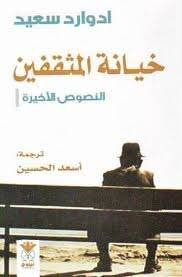Description
This post is also available in:
 العربية (Arabic)
العربية (Arabic)
Representations of the Intellectual
In these impassioned and inspiring essays, based on his 1993 Reith Lectures, Edward Said explores what it means to be an intellectual today.
Are intellectuals merely the servants of special interests or do they have a larger responsibility? In these wide-ranging essays, one of our most brilliant and fiercely independent public thinkers addresses this question with extraordinary eloquence.
Said sees the the intellectual as an exile and amateur whose role it is “to speak the truth to power” even at the risk of ostracism or imprisonment. Drawing on the examples of Jonathan Swift and Theodor Adorno, Robert Oppenheimer and Henry Kissinger, Vietnam and the Gulf War, Said explores the implications of this idea and shows what happens when intellectuals succumb to the lures of money, power, or specialization.
In six essays delivered as lectures for the BBC, Said (The Politics of Dispossession, p. 537, etc.) makes the case that intellectuals should maintain a vigilant skepticism toward all received wisdoms.
Said conceives of the ideal intellectual as “exile and marginal, as amateur, and as the author of a language that tries to speak the truth to power.” Some may find an exquisite irony in the spectacle of Said, a member of the Palestinian National Council, cautioning thinkers against allowing their ideas and reputations to be co-opted by patriotism, nationalism, and various forms of group-think.
But Said sees the irony as well, and he struggles honestly in these essays to describe a role for the intellectual in which the moral authority of the prophetic outsider is not purchased by forfeiting all political and social engagement. — Copyright ©1994, Kirkus Associates, LP. All rights reserved. –This text refers to an out of print or unavailable edition of this title.
Representations of the Intellectual
For more books
This post is also available in:
 العربية (Arabic)
العربية (Arabic)
 English
English 




